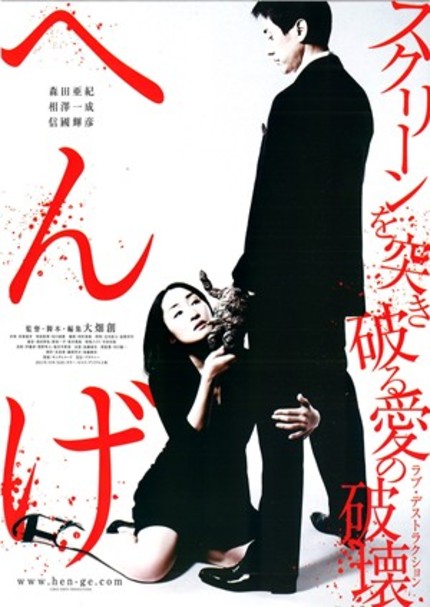L'Etrange 2012 Review: HENGE is Hilarious, Outrageous, Violent... And Kinda Heartwarming

Kazunari Aizawa and Aki Morita play a young married couple who seem like they would be happy enough, if only Aizawa wasn't having a violent, spasm-inducing stroke every other day. The voices he claims to hear before and after these don't help either. One night, when his leg transforms into a gooey, cockroach-like appendage and he throws his wife across the room while babbling in a pre-historic language, it becomes pretty clear that their marriage is about to face a test for which they didn't prepare in their vows. From here, the twists keep coming and the weirdness-quotient continues to increase exponentially, right up to a batshit-crazy climax.
Early Cronenberg is the easy and obvious comparison here, but it's also the most superficial. The film more often calls to mind 80's VHS oddities, with their sometimes baffling commitment to their material, and the matter-of-fact weirdness of a Kafka novel. Rather than trying to dress up the DV aesthetic, Ohata wisely embraces it, veering between harsh lighting and almost no lighting. The John Carpenter-esque score that booms in the background even during the dialogue scenes compliments the mood, creating a unified style that brings back fond memories of VHS horror marathons of yesteryear. The only thing that works against this aspect of the film is some CGI blood that's especially jarring, given how many great practical effects Ohata employs.
What sets Henge apart from those big-box VHS tapes is that Ohata is actually an excellent director with great visual sense and storytelling instincts. Often when a skilled filmmaker takes on inherently absurd material, we're left with a forgettable weird-for-the-sake-of-it film where we can almost hear the self-satisfied production team chuckling off screen. However, what makes this movie work is the fact that both Ohata and his actors remain completely dedicated to the material; they all seem to know that the only way to make a story like this really fly is to take the script more seriously than the audience. While Ohata often displays a sly sense of humor, he doesn't allow a shred of pretension or self-reflexivity throughout the film.
This conviction yields another pleasant surprise, perhaps more startling than all of the what-the-fuck visual twists combined: the film is actually emotionally engaging, and even sweet in its own strange, melancholic way. Part of the credit goes to the actors, who show surprising restraint in their performances. For example, when Morita finds it necessary to go to violent extremes for her husband, she doesn't play it as a self-conscious, over-stylized good girl/bad girl transformation -- she's simply a scared woman trying to be brave for the sake of her husband.
Also, the sparse use of dialogue makes many of the couple's conversations hit home emotionally. Sure, they're dealing with a problem that's slimier and more violent than those faced by most loving couples, but but there's a directness and emotional honesty in many of the exchanges that makes the conversations affecting on a more universal level. This emotional connection helps the film stay engaging even when it's completely done away with all other semblance of plausibility or logic.
But enough analysis! Henge is a messy, surprising, and chaotic good time, complete with a finale so mind-blowing that it makes the rest of the movie look like a well-mannered chamber drama in comparison. Certainly it contains some welcome familiar stylistic and narrative elements, but I'm still betting you've never seen a movie quite like this before.

Do you feel this content is inappropriate or infringes upon your rights? Click here to report it, or see our DMCA policy.






